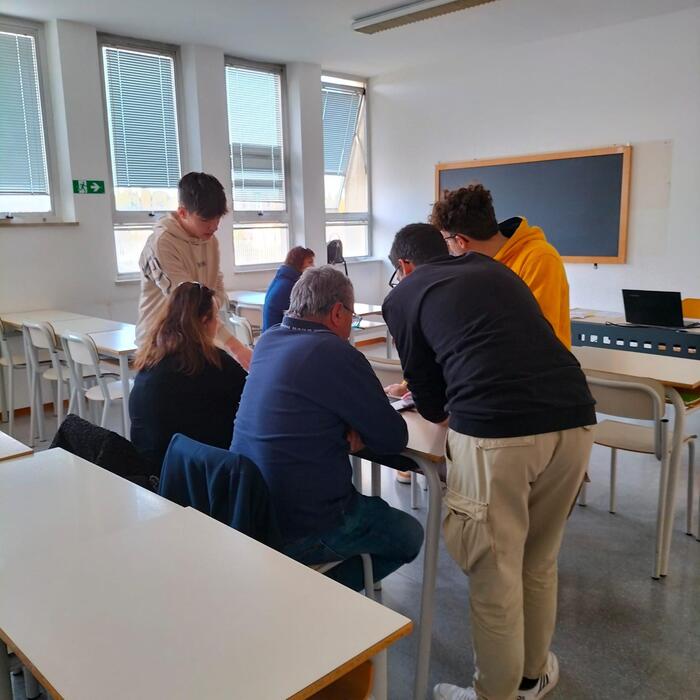Enlarge image
"As long as there is a well-developed network of special needs schools, school inclusion is made more difficult": Pupils in a special needs school (archive image)
Photo: A3250 Oliver Berg / dpa
From 1995 to 2017, the proportion of children and adolescents officially classified as “mentally handicapped” increased massively in all federal states, except in Hamburg and Bremen. Educational researchers, however, do not attribute this to more illnesses, but to the fact that the available special school places should apparently be used to capacity - even if the total number of pupils fell and therefore the number of diagnosed special school students should have decreased as well.
This is the result of a current study published by Marcel Helbig and Sebastian Steinmetz, researchers at the Social Science Research Center Berlin (WZB) and the Leibniz Institute for Educational Trajectories in Bamberg. According to this, the probability of having to attend a special school depends above all on the number of pupils on site and the range of special schools available in the region - and not on the needs of the individual pupil.
"This is particularly noticeable in East Germany," says Marcel Helbig, "here the number of children classified as mentally handicapped has remained constant, although the number of pupils has fallen by half." The result is, for example, in Thuringia, Brandenburg or Mecklenburg-Western Pomerania, the proportion of children who are taught in the »Intellectual Development« priority area has risen by more than one hundred percent by 2017.
"Self-preservation interest of the special school system"
The researchers say it is unlikely that there are medical reasons. "There is evidence that with the ratification of the UN Convention on the Rights of the Disabled, the special needs schools switched to referring difficult special needs students from the focus on 'learning' to the field of 'intellectual development'," says Sebastian Steinmetz. The educational researchers speak of a "strong self-preservation interest of the special school system".
This is also borne out by other figures: Despite the convention that was passed in 2008, which among other things guarantees the right to attend a regular school for children and young people with special needs, the number of those in Germany only decreased by 51.5 percent by 2017 Special schools. But that, says Marcel Helbig, is a problem: "As long as there is a well-developed network of special needs schools, school inclusion is made more difficult."
In addition, the establishment of special schools and the allocation of children and young people can promote the social division of the student body.
In another study, Steinmetz and Helbig examined the situation in Rhineland-Palatinate more closely.
The federal state is the only one that does not offer joint school lessons for children with and without disabilities across the board, but almost exclusively at selected specialty schools.
Researcher for the abolition of the priority schools
"However, this concept is at the expense of social interaction," state the educational researchers. The poverty rates in urban primary schools with special needs rose more strongly than in other schools. This could be interpreted as "the flight of the middle class from inclusive schools," says Marcel Helbig. The official school statistics also show how unfair the decisions for the specialty schools were: Even when they were converted to specialty schools from 2012, the selected elementary schools were significantly more socially burdened than other institutions.
Even after that, the proportion of children from low-income families in the inclusive focus schools in Rhineland-Palatinate, and thus the poverty rate, grew at an above-average rate. "In the cities in particular, this has exacerbated the problem of social segregation in primary schools," write Steinmetz and Helbig. Here, the proportion of poor children between priority schools and non-priority schools has doubled to twelve percentage points in the past decade.
The priority schools would then be faced with the task of having to shoulder a double integration effort: an educational and a social one. "This is at the expense of equal opportunities and shows that half-hearted inclusion can have unintended social consequences," adds Helbig. The researchers are therefore in favor of abolishing the priority schools in favor of inclusive teaching in all schools.
A study by the Berlin Science Center had already shown that Rhineland-Palatinate, along with Bavaria and Baden-Württemberg, is one of the nationwide worst performers when it comes to implementing school inclusion.
According to the study, the three federal states have "largely remained inactive" and "systematically violates the requirements of the UN Convention on the Rights of Persons with Disabilities to create an inclusive education system".








